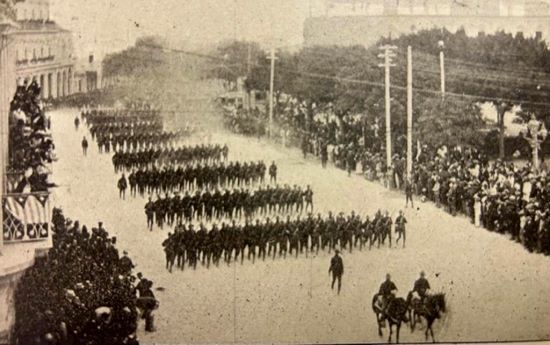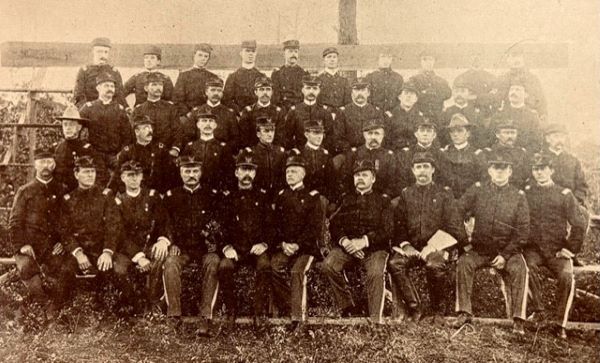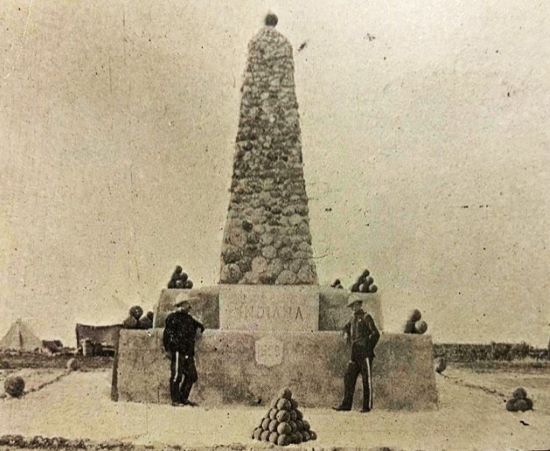


The 161st Indiana Volunteer Infantry served as part of the post-war
Army of Occupation in Cuba, stationed at Camp Columbia in the vicinity
of Marianao, Cuba from December 1898 to March 1899.
Unit History:
The 161st Regiment Indiana Volunteer Infantry was formed from
volunteer companies from Hammond, Mount Vernon, Shelbyville, Madison,
Jeffersonville, Richmond, New Castle, Rushville, Monticello, Columbus,
Michigan City and Lawrenceburg, Indiana and was organized to help fill
the Indiana quota under the second call of President
McKinley for troops to serve in the war.
Assembly and Muster
The men assembled at Camp Mount, a mustering and training camp named
for state's governor, located on the State Fair grounds, in early July,
1898. Here physical examinations of officers and men were conducted,
and, on July 15th, the regiment was mustered into the federal forces of
the United States as the 161st Indiana Volunteer Infantry. The regiment
consisted of 46 officers and 1,228 enlisted men under the command of
Colonel Winfield T. Durbin. Durbin had served in the American Civil War
where he was wounded, losing a finger. After the war, he was active in
the state militia.
Account of life in Camp Mount
Clarence B. Chambers, a private in Company D, provided some details of the regiment's experience at Camp Mount. He wrote “We went into quarters in the barns on the State Fair Grounds July 1st, and the boys immediately set to work cleaning up…The cooks were then elected and set to work in preparing dinner. Dinner was served about three o’clock in the afternoon, it consisted of a spoonful of rice, a potato boiled with the jacket on, a slice of bread, and a quart of coffee. The boys were hungry and were not very well satisfied with their dinner, but the cooks were new and were not fairly onto their job. Supper was much better we had beefsteak and beans and the boys eat until they were satisfied and by the next day all seemed to be in the best of spirits”. Company D's first picket duty came on July 6th, “when the camp grounds were unusually crowded with visitors, and the picket guards have a great deal of trouble owing to the fact that they have no uniforms and it is hard to distinguish soldiers from citizens”.On the morning of July 12th, the regular rules for drilling were put
in force, and the Articles of War were read on July 16. The first
attempt at a battalion formation took place July 18th, and Col. Winfield
T. Durbin thought they done exceedingly well for the first time.
Uniforms were finally issued to the boys on July 19, and the men were
glad to get them as their clothing was getting rather shabby, and
because the regiment now began to take on the look of military unit.
Company D was relocated to tents on the grounds just east of the race track on July 30 1898. Private Chambers stated “The boys of Company D drew their guns on Aug. 2, 1898, they were the Springfield rifle model of 1884, and belts were issued Aug. 5th 1898”.
The regiment remained at Camp Mount engaged in drill until August 11,
when the 161st was ordered to Camp Cuba
Libre, located at Jacksonville, Florida, where they arrived on
August 14. The regiment was assigned to the First Brigade, Third
Division of the 7th Army Corps, under Major
General Fitzhugh Lee. As the regiment was en route to
Florida, the United States and the Kingdom of Spain agreed to an
armistice ending the war's fighting.
Jacksonville, Florida, Camp Cuba Libre
According to Private Chambers, “At 1.40 A M. on August 14, 1898 our train landed in Jacksonville Florida…and was ran into Union Station where we got hot coffee. Rations were then passed around and we proceeded to eat breakfast. After breakfast our train was ran out to the camp grounds at Park Panama about five miles North of Jacksonville. It was Sunday morning and the heat was intense…”.
At Camp Cuba Libre, the 161st was brigaded with the 2nd Mississippi Volunteer Infantry and 3rd Nebraska Volunteer Infantry in the First Brigade.The 161st's regimental history records that “on the 17th occurred the first regimental formation in the South, regimental parade being held late in the afternoon; the following few days were spent as usual under such circumstances; there were tents to be floored, sinks and shacks to be built and land to be cleared; the temperature was 103° and the drilling necessarily very light, one and one-half hours only…”.
The regiment remained at Jacksonville engaged in training and trying to survive the heat. The regimental history states that “For sixteen days now the regiment had been sweltering in awful heat; the burning sun was above and the burning sand beneath, filling all space with direct and reflected rays of intensest heat that drove the men moping to their tents. A small breeze about 10 o'clock that came blowing its way so gently up from St. John's direction, as if it felt uncertain of its welcome, was all that made the day endurable. Between the hours of 11 and 12 wisdom drove every man into the shade and regimental work had to wait for cooler hours. The chief blessing of that climate is in the cool nights…”.
On September 4 the regiment suffered its first loss. Private Ernest
Pullman of Company A was swimming with some of his companions at Trout
Creek. He dove into the creek from a trestle. The water was shallower
than expected and Pullman broke his back. He was taken to the hospital
but died from his injuries.
Unfortunately by this time sickness was rampant. Private Chambers says “Notwithstanding our camp in Panama Park was kept clean and nice and had all the appearance of being a healthy place we had a great deal of sickness while there…After a time sickness began to increase so rapidly that it became necessary that the officers in command at the hospital divisions make a requisition on the different regiments for a detail to be sent to the hospitals to act as nurses…On October 23rd we began breaking camp at Park Panama Florida. We had a long and wearisome siege of it at this place and it will long be remembered by the boys of Company D as one of the unhealthiest places we were ever in”.
According to the regimental history, in early October the camp was hit with a hurricane. “October was ushered in by a Saturday that brought its usual inspection and accompanying quiet while the men lounged around in the shade, or strolled away to the river. The sky was a little overcast in the afternoon and no one would have been surprised if an ordinary storm had blown down upon us, but as night drew its sable gown around us and the men lay down to sleep, none ever dreamed of the things he should behold on the morrow; but the fact was that a hurricane had arisen in the West Indies and was fast sweeping toward us over the south Atlantic coast. The storm struck us in the 'wee small hours' of the night; the flags began their slap bang crack as the wind blew 'great guns,' and the rain poured down in torrents; the poles creaked, the tents swayed and the ropes tugged at the pegs, but they stood it well; yet a few went down in the night and their contents were blown over Duval County, while a few hats were supposed to have crossed the St. Johns river. No one could sleep and either lay or sat up in their tent, expecting every moment to be buried beneath the groaning canvas. At 5 AM. the storm abated and all hands were out to see the sights. It was a dismal scene that met the eye, but even while the men were talking of the night's experience, the elements began returning in all their fury; this time every blast that blew discounted one hundred-fold anything the night had seen. The storm seemed to grow fiercer with every passing moment; the tall pines moaned and strained their fiber as their tops came bowing to the ground, the flag-pole snapped and falling struck Sergeant Major Starr across the back a glancing blow that saved his life. One after the other the tents went down; the huge assembly tent was torn in shreds as the angry wind first blew it down and then played so fiercely underneath it; the wet soil had gathered tight around the pegs, but the houses were built on sand and true to prophecy fell. There was no waiting on orderlies then, but every man's hand was turned to save his property, and, while so engaged word came of needed help at the Third Division hospital. At once more men than could be used left their tents to the mercy of the wind, and went to render heroic service in caring for their sick comrades. By reason of their size the hospital tents were harder to keep from going down, but they were held in place by main strength at the ropes while firmer fastenings were secured. Everything in camp was drenched and the men were cold, tired and hungry. Although the storm was abated by 1 PM., a strong and threatening wind blew all day, and fearful of another night of similar experience, the Colonel made arrangements with the Florida Central & Peninsula Railroad to furnish passenger coaches for the comfort of the men and when they came out in the evening many of the men availed themselves of this opportunity to secure a good night's rest after the stormy events of that gloomy but stirring October day”.

The officers of 161st Indiana
Volunteer Infantry
Savannah, Georgia
On October 23rd, the 161st Indiana moved from Jacksonville to
Savannah, under orders to proceed to Cuba.
They arrived in Savannah on October 24, and were assigned to First
Brigade, Second Division, still of the Seventh Army Corps. According to
the regimental history, “Drills began on the 29th; a couple of days at
close order and attention was devoted to the more important skirmish
drill. A most suitable spot for extended order work was later found back
of the cemetery that lay near the junction of the road and street car
track, and here in the underbrush and ravines and around the old
Confederate breastworks the officers found ample room and excellent
environment for scattering their men to the best advantage for such
purpose. The last few days of October brought to the line officers the
usual burdensome necessity of getting the rolls in shape for monthly
muster and the new month came in with the sound of hammer and saw at
work on the commissary, bakery and guard house…On the 28th of November,
the regiment was issued the new United States magazine rifle, the Krag-Jorgensen,
together with the improvements adopted by the government; the men were
highly pleased and they relinquished with pleasure the old Springfields
with which they had been armed.”. According to Private Chambers, on
December 1st, seventy-one new recruits arrived at Savannah for the
161st, with most being transferred from the 159th
Indiana Volunteer Infantry in order to recruit the regiment up for
occupation duty in Cuba.
Before the regiment would leave the country, the war ended with the
signing of the Treaty of Paris on
December 10, 1898.
The 161st sailed from Savannah on the transport MOBILE on December 13th, arriving in Havana on December 15th. According to the regimental history, “…in addition to the 161st Indiana there was aboard the vessel one battalion and the band of the Second Illinois Volunteer Infantry, one or two companies of the Signal Corps, one company of the Fourth Virginia Volunteer Infantry, the Seventh Army Corps provost guard, General Williston with a portion of his staff, and many other officers and men of various detachments, in all to the number of probably two thousand souls…”.
According to Private Chambers, “The MOBILE [was] one of the finest equipped vessels in the United States for the transportation of troops having been fitted up by the government expressly for that purpose. She has all of the accommodations that can be found in the modern hotel, she was fitted up with spring mattresses…she had a capacity for carrying 2400 men without being crowded; she also had a dining room that would seat six-hundred people."
The 161st Indiana went into quarters at Camp Columbia, Marianao, Cuba, December 17, 1898. According to the regimental history, “The regiment had been given what seemed to us the most unlovely spot on all the island, but around us in every direction was a panorama of wonderous beauty; behind us the green fields adorned with magnificent palms stretched a mile away to Quemados and Marianao, whose red tiled roofs would have been visible ten times as far away…over nature as fair as God had ever made, rising in clear outline against the sky to our left were the northern limits of the Blanquizar mountains. On the gentle slope to our right were pitched the tents of the Second Illinois and the First North Carolina and beyond them the Brigade and Division headquarters, and just before us, three miles that looked like one, lay the shining waters of the Florida straits that washed the shore of the island and lost themselves far in the dim distance that it gave the men day dreams of the land they knew the waters touched far away in the north… Seven miles south of Camp Columbia are the Vento springs, beautiful and powerful, which supply Havana with the purest water and from which water was to be furnished the Seventh Army Corps; but until the piping work was completed, all the water was hauled in barrels from a spring beyond Mariano, two and one-half miles away. There was consequently at first a scarcity of water. One does not need to mention it, but the regiment needed a bath, and on December 23 the entire regiment marched three miles away to the sea coast, near Playa, and turned its coral beach for a brief time into a big bath tub for twelve hundred men”.
Christmas celebrated in camp. Company F used a cactus as a Christmas
tree. Gifts were hung from its needles, with the gifts consisting of
beans, hardtack, salt pork and candles. The officers of the regiment
celebrated with speeches, songs and a selection of solo dances. The
various regimental bands, including the 161st's
regimental band, performed. A Christmas dinner had been prepared
using the standard rations with additional ingredients purchased from
company funds, and the donation of funds from several individuals. The
extras included fruit, sweet potatoes, various canned goods and even
some chicken. The men were even given leave...but only to go within a
mile of camp.
On January 1st, 1899, the 161st Indiana marched to Havana to participate in the official handover of Cuba from Spain to the United States, as provided in the Treaty of Paris. The men of the 161st Indiana also felt the need to create a monument in their camp commemorating their service. The monument was created from coral quarried nearby and fashioned by eight men who were masons in civilian life. The base was 20 feet square and 4 feet high. Atop the base was a second layer that was 12 feet square and 3 feet high. On the second level a shaft 14 feet tall was erected. The regiment's designation was inscribed into the monument, as were names of the men of the regiment who died while the regiment was in Cuba.

The 161st Indiana Volunteer Infantry monument built by the regiment in Cuba
Return Home
Under orders to prepare for muster-out, the regiment left Camp
Columbia March 29, 1899, and embarked on the tranports
LOGAN (formerly the MANITOBA)
and MOBILE
for Savannah, Georgia, arriving there on March 31, where they again went
into camp and was finally mustered out and discharged April 30, 1899, at
Savannah with 46 officers and 1,153 enlisted men.
The regiment proceeded via Washington, DC, where they were reviewed by the authorities, and the companies which were from north of Indianapolis reached that city on the morning of May 3, where they were welcomed by Governor Mount who made an address, which was responded to by Col. Durbin, who delivered the colors of the Regiment to the authorities.
Roll of Honor - The 161st had suffered 18 enlisted men died of disease, 1 killed by accident, and 5 desertions:
Private Ernest R. Pullman, Company A, died September 3 accidentally after the diving from a railroad trestle into Trout Creek.Biederwolf, William E., History of the One hundred and Sixty-first regiment, Indiana Volunteer Infantry. (Logansport, IN: Wilson, Humphreys & Co., 1899). Available online at https://fedora.dlib.indiana.edu/fedora/get/iudl:686679/OVERVIEW
Chambers, Clarence B., "Indiana Volunteers in Camp," The Indiana
Historian. September 1998, 7-10. Copyright Indiana
Historical Bureau, 1998. Retrieved online at
https://www.in.gov/history/files/inspanishamerwar.pdf
Correspondence Relating to the War with Spain, Center for Military History, U.S. Army, Vol 1. Data Retrieved via http://www.fortwiki.com/160th_Indiana_Volunteer_Infantry
"Great Record Made," The Columbus Republican (Columbus,
Indiana). May 4, 1899, 1.
Record of Indiana Volunteers in the Spanish-American War 1898-1899. Issued by authority of the Sixty-first General Assembly of Indiana. Gen. James K. Gore, Adjutant General. W. B. Burford, Contractor for State Printing, Indianapolis, 1900. Available online in the public domain via the Library of Congress at https://lccn.loc.gov/01005459
"The Situation in Havana," The Morning Journal-Courier (New Haven, Connecticut). December 26, 1898, 1.
"Smith is Ill," The Richmond Item (Richmond, Indiana). January
31, 1899, 5.
"Soldier of the 161st Indiana Meets With a Horrible Death," The
Lexington Herald (Lexington, Kentucky). September 5, 1898, 3.